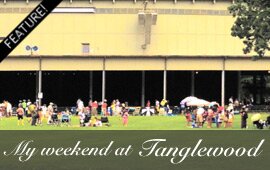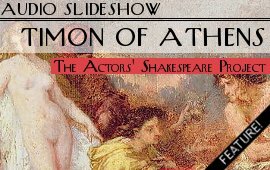
Highest props to the formidable Gil Rose to picking up a production of Tippet’s Midsummer Marriage left in the dust by Opera Boston’s demise and putting it on in a not unambitious semi-staging at Jordan Hall. I’ve long maintained that Gil Rose and his band, the , is the one classical (perhaps even just the one musical) outfit in town that really succeeds in doing what they like and making it work. They set an example for what the modern orchestra (regardless of their repertoire) should look like through everything from their programming to their website to their record label and releases.
All that said, BMOP’s music can be difficult and alienating and a three-hour semi-staged production of an opera with a libretto that’s far beyond even operatic standards of obscurity is no exception. Without a production to help digest the narrative, Midsummer Marriage was particularly difficult to absorb, even if one can rely on its thematic similarities to The Magic Flute. Program or liner notes will tell you that the opera is teaming with Jungian references, I’m of the mind that, for these symbols to work, they need to have some kind of visual representation in the production.
What we did get was an impressive chorus squeezed onto Jordan Hall’s stage–something a medium-sized opera company probably couldn’t pull off as well. And a few performers who did their best to convey some level of performance from behind their music stands. Baritone David Kravitz as King Fisher lent comedy and wit in his role as the opera’s beguiled and frustrated patriarch. Sara Heaton’s (as Jenifer) precise soprano was a pleasure and Joyce Catle’s diva-like descension to the stage lifted the production up, at a time when the libretto had pushed itself into a particularly weird corner. Deborah Selig and Matthew Dibattista, as one of the opera’s pair of couples, had enough of a dynamic to carry us through several prolonged asides.
The orchestra shook the hall with bolts of mythological thunder, took center-stage during musical interludes (or “dances”), and carried Tippet’s expressionistic and programmatic score well. Some might disagree, but I could’ve taken the opera cut down to some kind of concert scale, where the music might’ve been easier to absorb and the libretto, slightly condensed, easier to ignore during its difficult parts.





What did you find difficult about the music? I found it particularly appealing, as a example of midcentury English pastoral style. It was exhilarating to hear BMOP perform it so clearly and warmly. ASs for the libretto, as soon as you knew it was midcentury Jungian claptrap, it was fairly easy to ignore and focus on the mostly splendid performances. If you can handle Die Frau Ohne Schatten, Misummer Marriage hsould hold no terrors. I think you may need to get out more.
Well the music is particularly not difficult and I think the libretto was only so difficult because of this semi-staging. But you’re probably right, I could get out more.